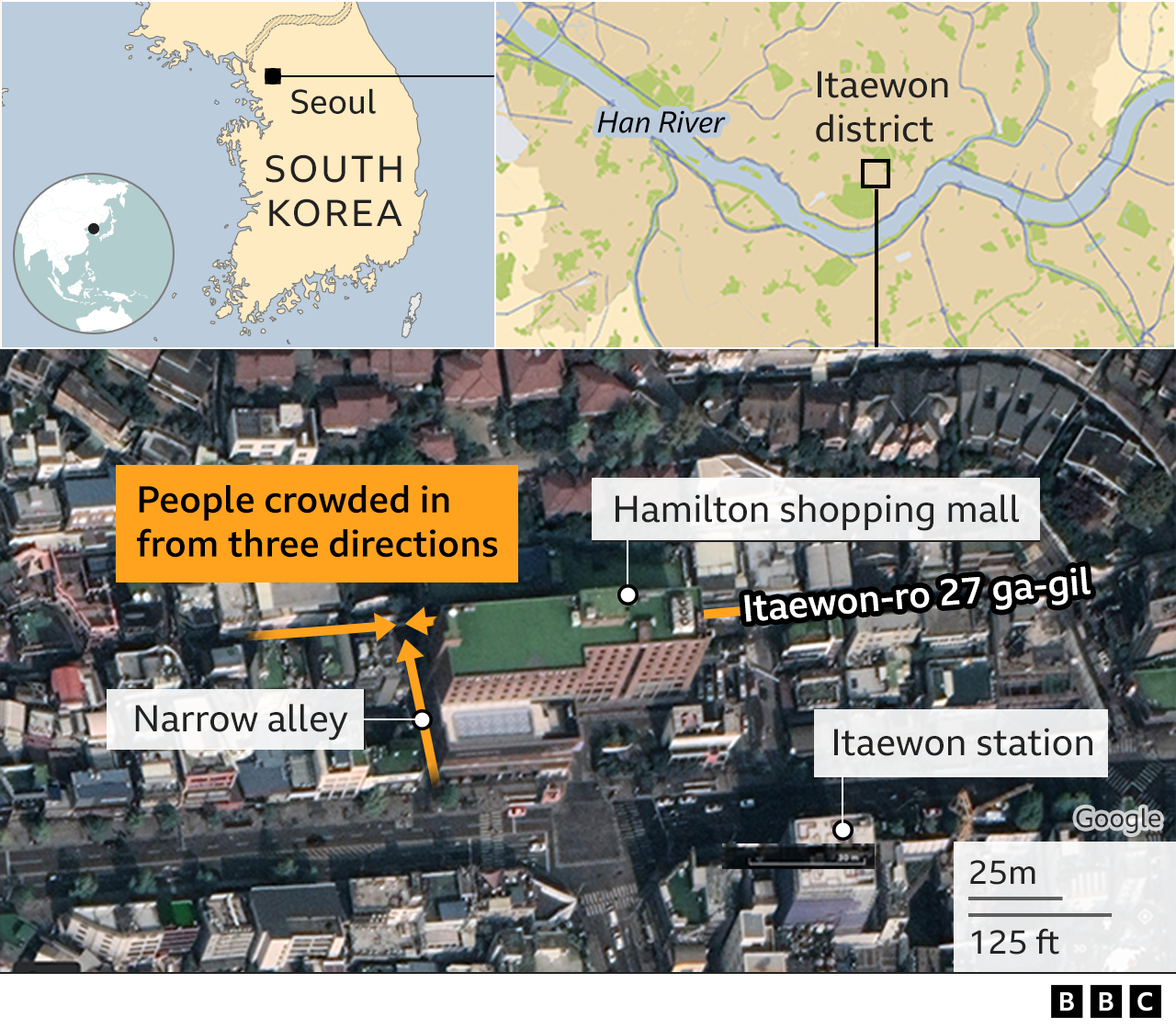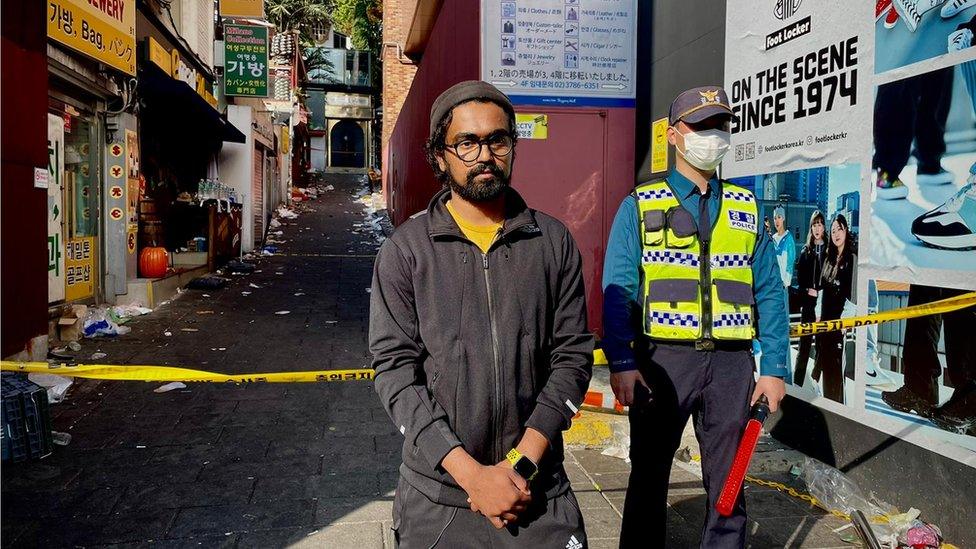S Korea Halloween crush: 'I was trapped on ledge, watching people die'
- Published
Watch: Scores of emergency services attended victims of Seoul's Halloween crush disaster
Survivors of the deadly Seoul Halloween crush have been speaking of their horror at watching friends and strangers suffocate in an alleyway as dance music blared into the night.
At least 153 people died when crowds thronged the Itaewon district of South Korea's capital.
"People began pushing from behind, it was like a wave - there was nothing you could do," Nuhyil Ahammed told the BBC.
"I couldn't sleep last night. I can still see people dying in front of me."
The 32-year-old, who spoke to the BBC on Sunday afternoon, said he was caught in the crush and there was nothing anyone could have done to save others or themselves.
Distressing videos of the event have spread across social media. Mr Ahammed himself shared his traumatising experience on Instagram.
The footage shows people, mostly teens or in their 20s, packed into a narrow, sloped alley so tightly they couldn't move. They then started being pushed in every direction. Some were dragged to the floor. Others couldn't breathe.
Itaewon is one of the most popular neighbourhoods in Seoul for a night out. Locals and foreigners flock there every weekend, but Halloween is one of the busiest nights of the year. The area was hosting its first unmasked Halloween celebrations since Covid when the disaster happened.
An estimated 100,000 people came to celebrate there on Saturday. For the first time since Covid, gathering sizes were not limited and people did not need to wear masks outside.
But South Korea's Interior Minister Lee Sang-min said officials did not anticipate such crowds in Itaewon's narrow streets.
"The expected size of the crowd in Itaewon did not deviate much from the previous years, so I understand that the personnel were deployed at a similar scale as before."
He said many officers had in fact been deployed elsewhere in the capital on Saturday evening.
"I am not certain about the exact number of police personnel deployed [to Itaewon] but a considerable number had been deployed at Gwanghwamun where a large crowd was expected for a protest," he told a briefing.
At least 82 people were also injured in the disaster. Mr Lee said some victims remained unidentified because they were below the age of 17 or did not have an adult ID.
President Yoon Suk-yeol has called for an investigation into the cause of the crush and declared a period of national mourning.

Mr Ahammed, an IT worker from India who lives in Seoul, said he had attended the Halloween party here for the last five years.
Last year there were more police in the area, he said, but this year the crowd was unlike anything he had seen before but there was "no crowd control".
Mr Ahammed was there with friends and said he couldn't recall why they wanted to enter the alley, except that it was a popular hangout for partygoers in costume.
But as soon as they got caught in the crowd, he knew something was wrong.
"Even if you stand still, someone pushes you from the front and someone from the back. It happened a few times. I realised something was wrong. I felt afraid something was going to happen."
He said he fell but managed to make his way to steps along the side of the alley: "A women with angel's wings - she beckoned me and I managed to climb onto a high step," he said.
"People were suffocating, screaming... getting squeezed... falling... there were just too many people.
"I was on the step just watching everything happening. They don't know what to do and nothing we can do."
He said he felt helpless as he watched people take what could have well been their last breaths. He was worried about his friends and he tried calling them but they did not answer. He would find out hours later that they had managed to escape the crowd.
Mr Ahammed didn't fully realise what had happened until the crowd dispersed and the ambulances arrived. "They started pulling bodies from underneath," he said. "One guy, he knows his friend is dead but he keeps giving him CPR for 30 mins."

Nuhyil Ahammed was pulled out of the crowd and saw many people struggling to breathe
Another friend tried to stop him, Mr Ahammed recalled, but the young man wouldn't stop. Next to them, he added, some people were still applying make-up like nothing had happened.
Slowly the true extent of the disaster revealed itself. The ambulances were so full with the injured who needed to be taken to hospital that they left behind the bodies of those who had died for up to an hour.
Later in the night, bodies, some in Halloween costumes, were lined up along the street covered in blue blankets. Others were carried lifeless into ambulances. Members of the public desperately administered CPR to those who were lying unconscious, along with hundreds of emergency workers who were sent in from around the country to help.
On Sunday morning, relatives and friends of missing people turned up at the scene looking for clues to reveal whether their loved ones were there. But the bodies had been moved from the street into a gymnasium, for family members to identify them.
The community centre is where the grief played out through much of Sunday. Relatives were arriving to find out whether their loved one were among the known victims. Some broke down when they were told there was no information yet. Others were escorted out because they were too devastated and too weak to walk.
One woman, who was looking for her 22-year-old son, was so distraught she could barely talk. She said he went to work last night at a night club in Itaewon and she hadn't heard from him since.
Altars for the victims are planned in various places in the capital.
The attention will inevitably shift to the safety standards and crowd control measures in place at these occasions. But for now, South Korea is grieving the death of so many of its young.
Additional reporting by Won Jung Bae and Hosu Lee